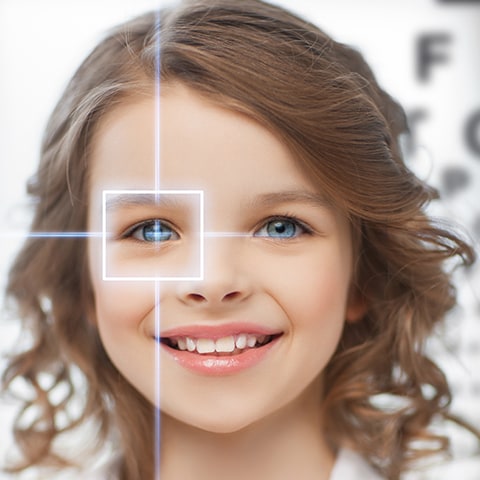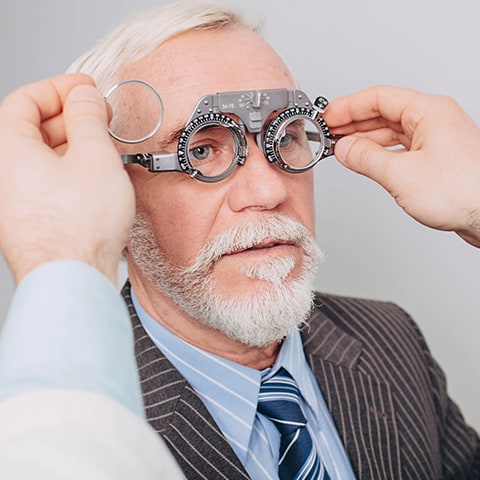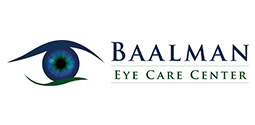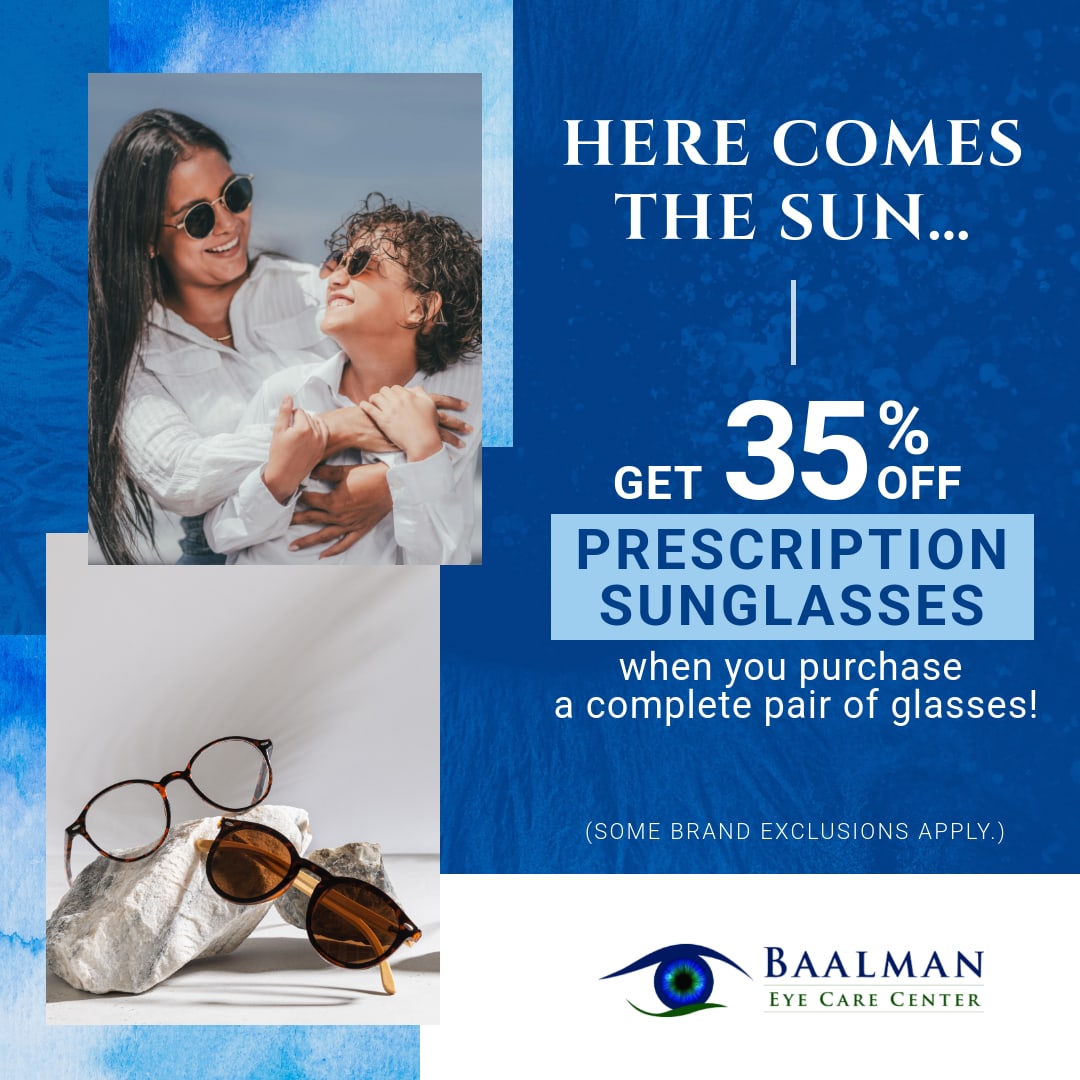Your Home for Traditional & Specialty Contact Lenses
Contact lenses are becoming increasingly popular for their convenience and ability to provide clear, crisp vision—but they can also address a range of eye conditions.
That’s right—if you’ve had trouble wearing contacts due to an eye condition, we can help!
Find a contact lens that works best for you and your lifestyle. With our modern technology and up-to-date approach, we’re here to support healthy, clear sight.
Book an appointment today, and let us help keep your vision sharp!
Book AppointmentOur Tech-Driven Approach
Our technology is at the heart of our contact lens experience.
Corneal topography maps the curvature of the eye. At the same time, anterior segment OCT imaging assesses different anterior segment eye variables to help identify potential problems such as keratoconus or dry eye that might require specialty lenses.
With the help of modern tech, we can prescribe lenses right for you and your eyes.
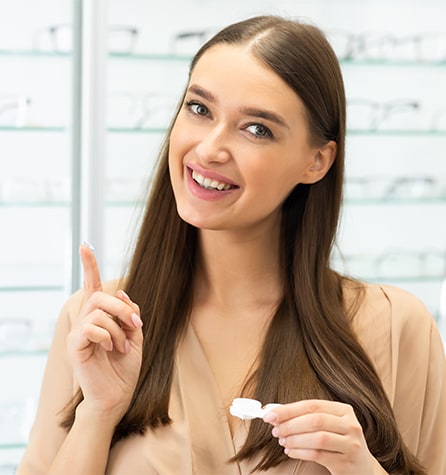

Scleral Lenses: Managing Keratoconus
Although many people can wear contact lenses comfortably, certain eye conditions can make finding contacts that suit your needs difficult. One of these issues is keratoconus, which affects 1 in every 2,000 people.
Because of how common keratoconus is, we can help address this concern with the help of special contacts known as scleral lenses. Learn more about this approach, or book an appointment today to see how we can help!
What Is Keratoconus?
Keratoconus is an eye condition in which the normally round cornea becomes thin and irregularly shaped. This can lead to blurred vision, distortion, glare, light sensitivity, and other visual disturbances.
Keratoconus can also affect your eye comfort, making it difficult to wear contact lenses.
How Scleral Lenses Could Help
Scleral lenses are a specialized type of contact lens that can help address the symptoms of keratoconus. These lenses rest on the sclera (the white part of the eye) and provide a smooth surface for vision clarity and eye comfort.
Additionally, these lenses provide a protective vault over the corneal surface, helping to reduce glare and improve comfort for those with this unique eye concern.
Common Contact Lenses
Daily Lenses
Daily contact lenses can be an excellent option for people who want to improve their vision without glasses.
Daily contacts are single-use lenses disposed of after wearing them and can address many refractive errors.
Multifocal Lenses
Multifocal lenses are designed to help those with presbyopia or age-related farsightedness. These contact lenses have multiple prescriptions in the same lens, allowing clear vision at both near and far distances.
These lenses are available in soft and rigid gas-permeable materials, allowing for a more customized fit.
Astigmatism Lenses
Astigmatism contact lenses, or toric contact lenses, are designed to correct astigmatism. These lenses are tailored to the curvature of your eye and provide clear vision without distortion.
Specialty Contact Lenses
RGP Lenses
Rigid gas-permeable (RGP) lenses are a special type of contact lens made with durable materials that typically provide clearer, crisper vision than soft contact lenses. However, these lenses might take longer to get used to compared to soft contact lenses.
Bandage Lenses
Bandage contact lenses are specialized contacts designed to help relieve the symptoms of severe dry eye and other corneal conditions.
These lenses are quite thin, allowing them to conform smoothly to the eye’s surface. Additionally, their breathable material allows oxygen to reach the eye, relieving irritation and discomfort.
Amniotic Membranes
Amniotic membranes are medical devices used in emergencies to help soothe and protect the eyes from further concerns. They are made from a thin sheet of amniotic tissue placed over the affected eye, relieving symptoms like dryness, redness, and discomfort.
Amniotic membranes work by helping to hydrate the surface of the eye and reduce inflammation, making them an effective treatment for dry eye and other corneal conditions.
Taking Care of Your Contacts
Contact lenses can be a great alternative to eyeglasses, but they also come with a list of responsibilities. To help keep your eyes safe and comfortable, here are some tips for caring for your contact lenses:
- Always wash your hands thoroughly before handling your contact lenses.
- Make sure to stick to the wearing schedule prescribed by your optometrist. Overwearing your contacts can lead to discomfort or even permanent damage.
- When cleaning and disinfecting contact lenses, always use fresh solution and follow the directions provided by the manufacturer carefully.
- Never swim with contacts in; chlorine and other chemicals in water can cause irritation and can damage lenses over time.
- Ask your optometrist before using any type of eye drop with contact lenses, as many products may contain ingredients that are not safe for use on lenses.
Book an Exam & Fitting Today!
At Baalman Eye Care Center, we don’t just find you any lenses—we find the lenses right for your needs and lifestyle. Let us help you see the world in a new light!
Book your contact lens exam and fitting today!
Book AppointmentBrands

Alcon
Alcon has one mission: to provide innovative products that enhance quality of life by helping people see better. Alcon is and uniquely poised to serve every contact lens wearer by addressing the full life cycle of their needs. Designed in the USA.

Bausch + Lomb
Bausch + Lomb is one of the best-known and most respected American healthcare brands globally, offering the widest and finest range of eye health products including contact lenses and lens care products, pharmaceuticals, intraocular lenses, and other eye surgery products.
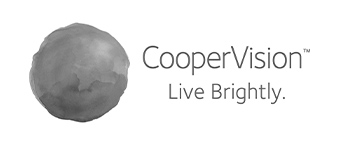
CooperVision
We create and execute innovation that is unmatched in the contact lens industry. There's much more to our story than that, however. You'll find that what sets us apart is how we approach our business. We collaborate, we listen, and we enjoy what we do. Designed in the USA.
Visit Our Location
We’re located South of Wichita Northwest High School on N. Tyler Road. Parking is available out front.
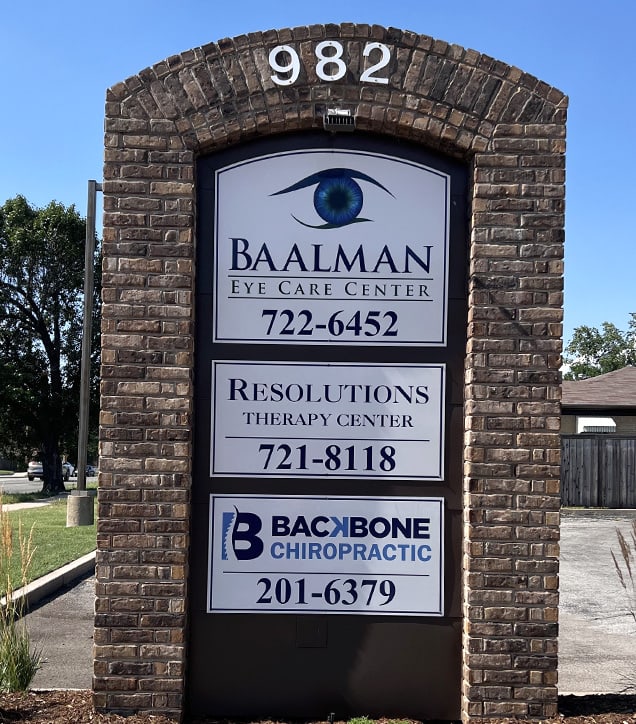
Our Address
- 982 N. Tyler Road Ste. A
- Wichita, KS 67212
Contact Information
- Phone: 316-722-6452
- Email: frontdesk982@gmail.com
Hours of Operation
- Monday: 8:00 AM – 6:30 PM
- Tuesday: 8:00 AM – 5:30 PM
- Wednesday: 8:00 AM – 6:30 PM
- Thursday: 8:00 AM – 5:30 PM
- Friday: 8:00 AM – 1:00 PM
- Saturday: Closed
- Sunday: Closed
Our Brands




Our Google Reviews
Our Blogs
What Glasses Are in Style for 2026?
Eye GlassesYou want to look current and feel confident in your new glasses, but keeping up with changing trends can feel overwhelming. Between scrolling through endless online options and wondering what actually works for your face shape, choosing stylish frames can feel complicated. Baalman Eye Care Center can help you find frames that match both current […]
Why Do I Keep Waking Up with Dry Eyes?
Dry EyeYou open your eyes each morning to a scratchy, gritty feeling that makes you want to close your eyes again and go right back to sleep. At Baalman Eye Care Center, we understand how frustrating morning eye discomfort can be. Morning dry eye can happen because tear production can naturally slow down during sleep, as […]
How Do You Know if You Need Glasses?
Eye Exams, Eye Glasses, Eye HealthMaybe you’ve been squinting at your phone screen more often, or those street signs seem fuzzier than they used to. Your eyes feel tired after work, and headaches have become your unwelcome afternoon companion for a little while now. These everyday moments might be telling you something important about your vision. You might need glasses […]
What Glasses Are in Style for 2026?

You want to look current and feel confident in your new glasses, but keeping up with changing trends can feel overwhelming. Between scrolling through endless online options and wondering what actually works for your face shape, choosing stylish frames can feel complicated. Baalman Eye Care Center can help you find frames that match both current […]
Why Do I Keep Waking Up with Dry Eyes?

You open your eyes each morning to a scratchy, gritty feeling that makes you want to close your eyes again and go right back to sleep. At Baalman Eye Care Center, we understand how frustrating morning eye discomfort can be. Morning dry eye can happen because tear production can naturally slow down during sleep, as […]
How Do You Know if You Need Glasses?

Maybe you’ve been squinting at your phone screen more often, or those street signs seem fuzzier than they used to. Your eyes feel tired after work, and headaches have become your unwelcome afternoon companion for a little while now. These everyday moments might be telling you something important about your vision. You might need glasses […]






